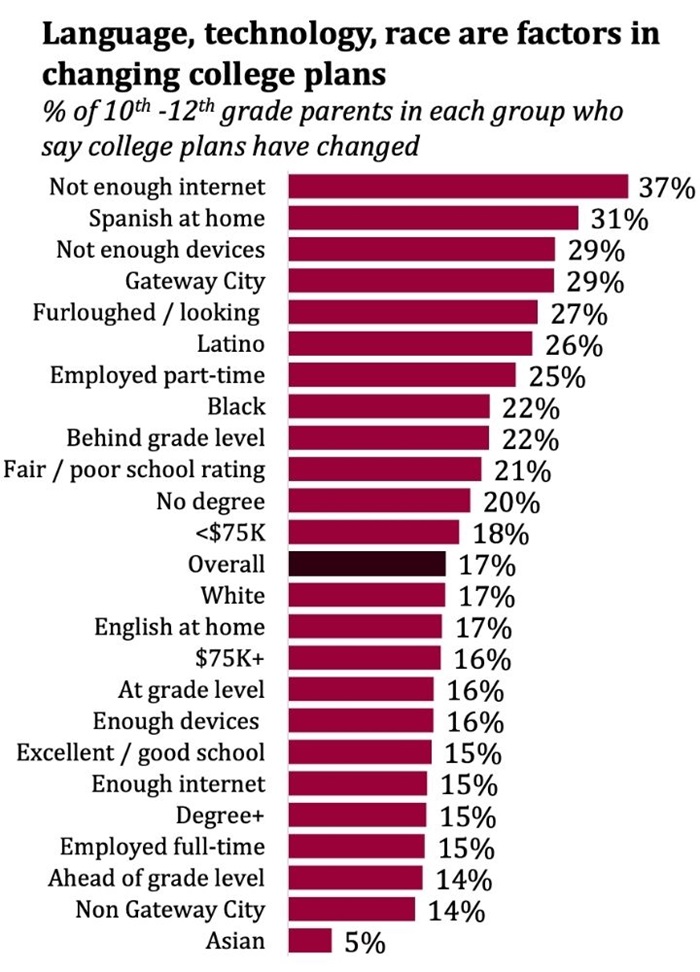Online Learning and Navigating COVID 19
>> Back to the main Resource Hub page
ExpoHigher Education in Massachusetts, like the rest of the world, has been dramatically impacted by the COVID-19 pandemic. Limited colleges are offering courses in-person, and learning and campus life has largely moved online. For many students, the already complicated transition to and through college has become increasingly difficult.
- A poll in summer 2020 by MassINC Polling Group found “minority and low-income students are more likely than white and better-off students to have changed college plans due to the pandemic… Students who lack sufficient communication devices or internet access and students with language barriers are also among those most likely to have changed college plans or to be considering deferring their college attendance.”
- Recent recessions have increased existing employment gaps between people with and without a post-secondary degree. Research shows that students are better off earning a postsecondary degree versus not. Both college-bound and career-bound students are at risk of losing momentum in 2020-2021 and transitioning to a less secure postsecondary pathway.
In this unprecedented and difficult time, reach out to students and encourage them to continue their pursuit of a college degree. There are resources, emergency assistance, and supports available to help students navigate college during COVID-19.
Quick Links
- US Department of Education: COVID-19 Resources for Schools, Students, and Families
- Learning Policy Institute - Resources and Examples: Learning in the Time of COVID-19
- uAspire COVID-19 Support Resources
- Grantmakers for Education: COVID-19: Tools for Educators & Learners
- Hanover Institute's Best Practices in Online Learning for At-Risk Students
- US Dept. of Education – What Works Clearinghouse: Using Technology to Support Postsecondary
Student Learning Supporting Students During the COVID-19 Crisis
More than ever, students may be struggling to stay engaged with college and their academics. This may be due to the new virtual format, increased responsibilities at home, financial pressure, anxiety and feeling overwhelmed in both their academic and personal lives.
- Students may need additional resources for basic needs, have increased housing or food insecurity, or have greater mental health struggles. Consult Basic Needs & Social Services for more resources.
- COVID-19 Relief Links:
- Massachusetts State COVID-19 Site
- Boston Resiliency Fund - grantees provide relief to affected communities.
- EMPath Covid-19 Resources
- Massachusetts Immigrant Collaborative - Emergency Immigrant Relief Fund
- Colleges also have specific programs for students who are struggling during the pandemic.
- UMass Boston’s RESPOND Initiative (Contact Danielle Wheeler) connects students with a peer coach trained in academic success coaching, particularly for remote learning.
- Bunker Hill Community College and other campuses have many resources to respond to students’ basic needs, including SingleStop, relief funds and technology support, and food pantries.
Addressing Technology Needs and Barriers
- Students facing barriers to online learning should reach out to colleges for support. Most schools have resources such as laptops to give or lend.
- City of Boston – Internet Connectivity and Technology Supports During COVID-19 Response (includes low/no cost internet and upgrades, etc.)
- Boston School Finder – Coronavirus Home Learning Resources
General Tips
- Work with students to come up with systems and schedules that work.
- Maintain regular communication with students. Challenges can arise and become overwhelming quickly.
- Typical minor road bumps for students (e.g. completing forms, routine financial aid steps) are increasingly problematic during this time. Issues that would be easily resolved with a visit to a campus office may require more steps and extended communication. Work with students to remain focused and persistent, despite setbacks.
- Stay on track with college and career milestones, including things like internships and networking, which can be pursued online.
Digital Learning Checklist
The following is a basic checklist that may be useful to students as they prepare for virtual classes.
Preparing for Online Classes:
☐ Download and install Zoom or WebEx on your computer and phone
☐ Download and install Canvas or other applicable course software
☐ If you do not have access to a computer, reach out to your school for a loaner or free computer
☐ Contact disability services to arrange for academic accommodations
☐ Reach out to academic advising for learning support
Preparing a Workspace:
☐ Find a quiet space to work and learn
☐ Avoid background distractions if possible
☐ Turn on the lights
☐ Communicate to family and those around you that you are “in class” and need to focus
☐ Ensure you have all necessary technology, including headphones with a microphone
Academics and Advising
☐ Email your Success Boston Coach and Academic Advisor at your school for help with academic issues
☐ Form study groups in order to create a virtual community and to build your network
☐ If you have questions after finishing the lesson, reach out to your instructor or teaching fellows/assistants.
☐ At the end of each week, check your syllabus to make sure you don’t forget deadlines


